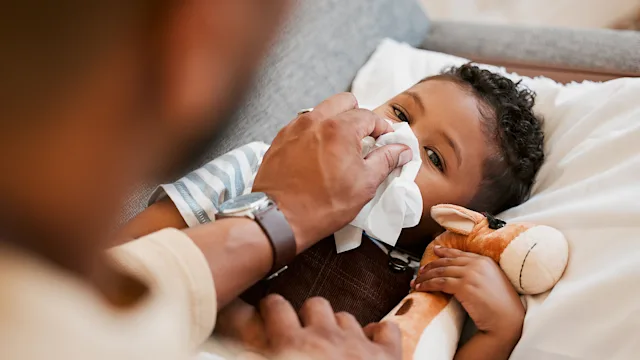Key takeaways:
Most kids get sick with respiratory syncytial virus (RSV) by their second birthday.
Childhood RSV can usually be managed at home with over-the-counter (OTC) fever reducers, saline nasal sprays, and humidifiers.
The best way to protect all babies from RSV illness is through vaccination with Beyfortus.
Respiratory syncytial virus (RSV) is a common cold virus that’s active in the winter months. RSV infects your nose, throat, and airways. It usually causes common cold symptoms. But babies and toddlers can develop more severe RSV illness, including lower respiratory tract infections like bronchiolitis.
RSV symptoms can last up to 10 days. And your child can feel pretty miserable during that time. There’s no cure for RSV. And since RSV is a virus, antibiotics won’t help your child recover faster. The good news is that, with the right home remedies and over-the-counter (OTC) treatments, most children can recover at home without prescription medications.
Here are the four best treatments to help your child recover from RSV.
1. Fever reducers
Babies and toddlers often develop a fever when they’re sick with RSV. Children over 3 years old may not develop fever but can still feel run down and tired. Fever and fatigue are signs that your immune system is responding to a virus. While this is a good thing, the inflammation that results can make your child feel pretty miserable.
OTC fever and pain relievers can help ease your child’s fever and fatigue. You can try children’s
acetaminophen (Tylenol) for relief. Acetaminophen is available in liquids, pills, suppositories, and even rapid-dissolving powder. Children can take acetaminophen every 4 to 6 hours as needed.
You can also try children’s ibuprofen (Motrin) to ease their symptoms. Ibuprofen is safe for kids over 6 months old. It can be taken every 6 hours as needed.
Don’t give your child aspirin for pain or fever relief. Aspirin use in young children with viral illnesses has been linked to Reye’s syndrome, a life-threatening condition.
You may find that your child responds better to either acetaminophen or ibuprofen. Choose whichever OTC fever reducer works best for your family. You don’t need to use both medications. Most experts recommend sticking with one OTC fever reducer to avoid accidentally giving your child too much medication.
How can you tell if your child has RSV? Our experts review the most common RSV symptoms in babies, toddlers, and school-aged kids.
RSV illness is preventable. Here’s how Beyfortus can help keep your baby from getting sick with RSV.
Have more questions about RSV? Our Childhood RSV Guide has the answers you’re looking for.
Make sure to follow dosing instructions on the package. You can also check with your child’s primary care provider for the correct dose.
Call your child’s primary care provider right away if your child develops a fever that doesn’t get better with acetaminophen or ibuprofen, or if your child is less than 8 weeks old and develops a fever. This can be a sign of a more serious illness.
2. Fluids
Fluids are one of the most important treatments for RSV illness. That’s because an RSV illness creates the perfect environment for your child to develop dehydration. Here are some ways RSV increases the risk for dehydration:
RSV causes your body to produce a lot of mucus, which takes a lot of your body’s fluid to make. In fact, a runny nose may be the first and most obvious sign that your child has RSV.
Babies have a hard time drinking when they’re congested. It doesn’t take very long for a baby to become dehydrated when they aren’t drinking enough breastmilk or formula.
Other RSV symptoms, like fever and faster-than-normal breathing, also increase the risk for dehydration.
Older children may lose interest in eating and drinking when they feel sick, which also puts them at risk for dehydration.
Dehydration not only makes your child feel worse, it keeps their body from being able to fight off the RSV virus. It can worsen an RSV illness and lead to other serious health complications. Many children need hospital care due to dehydration from RSV.
To avoid dehydration, make sure your child drinks enough fluids. Here are some tips to help:
For infants, continue to offer breast milk or formula in smaller, more frequent volumes than usual. Your child’s primary care provider may also recommend adding oral rehydration solutions, like Pedialyte.
For toddlers or older children, try popsicles, watered-down juice, Pedialyte, and other electrolyte-containing drinks. You can even make your own Pedialyte at home.
Offer 2 oz to 4 oz of fluid every 2 hours while your child is awake. Although your child may not drink a lot at once, small amounts will add up throughout the day.
Your child should be going to the bathroom or making a wet diaper at least every 6 hours. Their urine should be light-colored. Contact your child’s primary care provider right away if your child isn’t making enough urine, shows or they have other signs of dehydration — like a dry mouth or lips — or they seem extra tired or fussy.
3. Humidifiers
A humidifier is one of the best tools to have on hand when your child is sick with RSV. Humidifiers add moisture to the air. It’s easier to breathe in moisturized air, especially when RSV illness causes inflammation in your nose and airways.
Moisturized air also helps loosen congestion by adding extra moisture to mucus. Loose mucus is easier for your child to cough up or blow out through their nose. Easing congestion can help your child breathe and sleep easier.
You can use either a cool-mist or warm-mist humidifier. But keep in mind that warm-air humidifiers can pose a burn risk if your child touches the heated parts or water. A cool-mist humidifier may be safer for young children.
Make sure to clean your vaporizer or humidifier daily to prevent mold or bacteria growth. Follow your humidifier’s cleaning instructions, and change the water reservoir each day.
4. Nasal saline
Nasal saline is an OTC medication that’s available in forms such as sprays and single-use vials. It also comes in powders that can be mixed with sterile or distilled water to make a nasal saline solution.
Nasal saline helps clear mucus from your child’s nose and the back of their throat. This can ease congestion and make it easier for them to breathe. Older children may sleep better with less congestion. Babies will be able to drink and rest more comfortably with clear nasal passages.
To use nasal saline, place several drops in one of your child’s nostrils. Then, gently suction out the saline and mucous with a bulb syringe or nasal aspirator. Repeat this process on the other side. You can buy bulb syringes and nasal aspirators at your local pharmacy.
Older children may be able to use a neti pot for nasal saline rinses.
Getting children to cooperate with nasal saline rinses isn’t always easy. While nasal saline can be used anytime, it’s best to use before eating and sleeping to maximize its benefits.
Nasal saline is safe for children. Other cough and cold medications may not be safe for children younger than 4 years old. The American Academy of Pediatrics and other groups of medical experts agree that children under 4 shouldn’t take OTC cold medications.
How do you treat severe RSV illness?
Some children are more likely to develop severe RSV illness, including:
Babies born prematurely
Babies younger than 6 months of age
Children with heart or lung conditions
Children with weakened immune systems
Children with severe RSV illness usually have to be treated in a hospital, where they can receive additional support like:
Specialized suctioning to clear mucus from their nose and upper airways
Extra oxygen through a nasal cannula or high-flow nasal cannula
Fluids through an intravenous (IV) or nasogastric (NG) tube to treat and prevent dehydration
Breathing support with positive airway pressure
Children with underlying heart or lung conditions may need additional medications and treatments. Some children also develop pneumonia when sick with RSV. These children may benefit from treatment with antibiotics.
How can you protect your children from getting sick with RSV?
Childhood RSV can be serious. Luckily, there are ways to keep your baby safe. The best way to keep your child healthy is to make sure they receive Beyfortus.
Though often called the “RSV vaccine,” Beyfortus is actually a monoclonal antibody. It’s given as an injection but doesn’t work the same way as a traditional vaccine to prevent illness.
What’s more important is that Beyfortus is safe and effective. Beyfortus lowers the risk of hospitalization from RSV illness by 90%. This means babies who receive Beyfortus are much less likely to develop severe RSV illness. Many don’t get sick at all. Protection from Beyfortus lasts about 5 months, which covers an infant’s first RSV season when the risk of severe RSV illness is highest.
Experts recommend that all infants younger than 8 months old receive Beyfortus. It’s safe for newborns. Children between 8 and 19 months can also receive Beyfortus if they have certain medical conditions that increase their risk of severe RSV illness.
Some children may also be able to receive Synagis. This is another monoclonal antibody that’s given monthly to prevent RSV illness. Synagis isn’t available for all children.
People who are pregnant can receive Abrysvo, an RSV vaccine. If you receive Abrysvo between weeks 32 and 36 of pregnancy, your newborn won’t need Beyfortus. Protection from Abrysvo will protect your newborn throughout their first year of life.
There are other steps you can take to keep your child safe from RSV and other common viral illnesses like COVID-19 and the flu:
Wash your hands often
Wear a mask in crowded social settings during cold and flu season
Clean frequently touched household surfaces
Avoid people who have cold symptoms
Cover your cough if you become ill
The bottom line
Most kids will get RSV by the time they are 2 years old. Most children can be treated for RSV illness at home. The best treatments include fluids, OTC fever and pain relievers, humidifiers, and nasal saline. Avoid using OTC cough and cold medications in children younger than 4 years old. Beyfortus, an injection, can keep children safe from severe RSV illness. All infants should receive Beyfortus during their first year of life.

Why trust our experts?


References
American Academy of Pediatrics. (2024). Nirsevimab frequently asked questions.
American Academy of Pediatrics. (2024). Respiratory Syncytial Virus (RSV) prevention.
Du, X., et al. (2020). Respiratory syncytial virus infection‐induced mucus secretion by down‐regulation of miR‐34b/c‐5p expression in airway epithelial cells. Journal of Cellular and Molecular Medicine.
Healthychildren.org. (2022). Coughs and colds: Medicines or home remedies? American Academy of Pediatrics.
Healthychildren.org. (2023). How to care for your child’s cold or flu. American Academy of Pediatrics.
Jain, H., et al. (2023). Respiratory syncytial virus infection in children. StatPearls.
Jenco, M., et al. (2024). Report: RSV immunization 90% effective in preventing infant hospitalization. AAP News.
Ntim, G. J. (2023). Common cold. Pediatric Care Online.
Sanofi. (2024). Dosing & administration.
Smith, C., et al. (2012). Alternating acetaminophen and ibuprofen for pain in children. Canadian Family Physician.
Synagis. (n.d.). What is Synagis?
U.S. Food and Drug Administration. (2024). Should you give kids medicine for coughs and colds?






